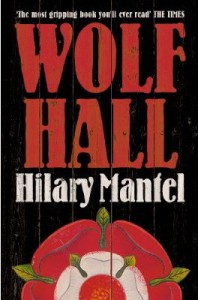Wolf Hall
 You pick your prince, and you know what he is
You pick your prince, and you know what he isAlthough the Man Booker Prize lists have long been a reliable source for new reading material, 2009 winner Wolf Hall by Hilary Mantel never really appealed to me. I rarely read historical fiction, assuming it will either be stuffy and stilted and old-fashioned, or fluffy and cutesy and and old-fashioned. And while I may never become a huge fan of the genre, I can at least try to keep an open mind, particularly when it comes to reading more works by women.
Concerning Wolf Hall, the high-level story is familiar enough even to this American. Henry VIII wishes to annul his marriage to Katherine of Aragon in order to marry Anne Boleyn in the hopes that she will provide what Katherine could not: a male heir. The Pope will not agree to such a concession, so Henry severs ties to the Catholic Church and appoints himself head of the church in England. Of course, there are all sorts of details that the shorthand version of this story leaves out, and Wolf Hall fills in those details by focusing on the role of Thomas Cromwell, a commoner who eventually becomes Henry’s closest advisor.
Henry is not yet the all-powerful monarch he’s thought of today. The Tudor line is only recently ascended to power, and Henry’s position is tenuous, at best. He is poor relative to other major rulers of the time, and several factions are plotting to take control when he stumbles. Cromwell guides Henry through these difficulties, first out of a sense of duty to his own patron, Cardinal Wolsey, Henry’s Lord Chancellor, but as Henry begins to realize the fruits of Cromwell’s advice, he relies more and more on Cromwell to consolidate his power and wealth while also bringing him closer to what he desires most: Anne Boleyn and the elusive male heir.
After reading this book, I can only say that Mantel must be some kind of wizard, because she managed to write a book that felt both of its time and also very modern. She didn’t try to write the book as if she were a 16th-Century scribe, mostly avoiding archaic words and spellings and syntax, but she also didn’t force the characters into anachronistic modern speech. Her most powerful moments came not in the big dramatic events but instead when she allowed her characters a chance to pause, to breathe and reflect, and often to grieve.
I will admit that the last third or so dragged for me, as I didn’t really know what the story was meant to be building towards. The writing was still just as powerful, but it felt as if the story had peaked too early and then treaded water until the end. I’m sure my ignorance of the historical context is partly to blame, but I also think Mantel could have done more to establish why these later events were important enough to serve as the final climax. I wish I’d enjoyed the overall story as much as her writing, yet I’m also invested enough to add Mantel’s followup, Bringing Up the Bones, to my wishlist.
(This review was originally posted as part of Cannonball Read 10: Sticking It to Cancer, One Book at a Time.)



